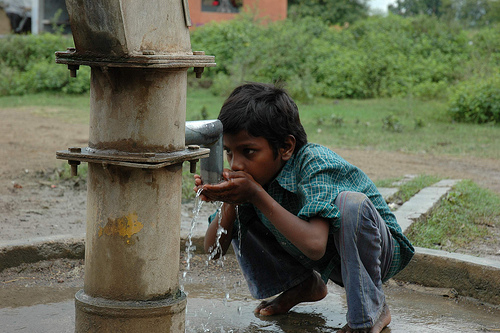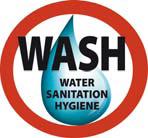Sanitation
UN General Assembly's resolution on water and sanitation as a human right
Posted on 22 Nov, 2014 10:30 AMThe recent UN General Assembly Resolution on declaring water and sanitation as human right is or can be a powerful impetus to securing universal access to water and sanitation for people everywhere. This is the most recent in a string of initiatives to advance the provision of these essential services. Beginning with the UN Decade of Water in the eighties, then the declaration of the Millennium Development Goals, and later the adoption of General Statement 15 by the Economic and Social Council of the United Nations in 2002 the recognition of the fundamental importance of water (and more recently sanitation) to life, health and well being has been accepted at the international level. In India, while there is no specific mention of the right to water in the Constitution, the Supreme Court in its judgement(s)has upheld this as part of the right to life. Some organizations are working to make this a fundamental right, to remove any ambiguity.

Boy drinking water from handpump in Guna, Madhya Pradesh - Handpumps and wells are still one of the major source of drinking water in India.
Photo credits: Anil Gulati
Floods drinking water contamination mining and waterbodies water bills water conflicts News roundup 17 August 2010
Posted on 22 Nov, 2014 10:30 AMFloods: lessons to be learnt from the massive flooding in Surat city
A report by IIM criticises the way in which dams are managed in the country and calls for the need to apply Management Science / Operations Research techniques and information technology to improve dam management and prevention of floods
Status of urban water supply sanitation and solid waste management CPHEEO data 2005
Posted on 22 Nov, 2014 10:30 AMThis link on the Central Public Health and Environmental Engineering Organisation (CPHEEO) website, presents data related to the status of the urban water, sanitation and solid waste management in India. The data includes information on:
- Status of water supply (physical)
- Status of urban water supply (financial)
- Status of urban sewerage/sanitation system
- Status of low cost sanitation
- Status of solid waste management
Data is included from different states in India namely Assam, Arunachal Pradesh, Karnataka, Gujarat, Maharashtra, Mizoram, Pondicherry, Sikkim and Tamilnadu respectively.
Deaths due to water pollution
Posted on 22 Nov, 2014 10:30 AMDeaths due to water pollution occur mainly as a consequence of drinking of contaminated water. The common diseases caused by consumption of contaminated water are Cholera, Viral Hepatitis, Enteric Fever (Typhoid) and Acute Diarrhoeal Diseases (ADD).
The number of deaths reported State-wise on account of Cholera, Viral Hepatitis, Enteric Fever (Typhoid) and Acute Diarrhoeal Diseases (ADD) for the years 2007, 2008 and 2009 are given in Annexure – I-III.
India WASH forum enewsletter Update 13 July 2010
Posted on 22 Nov, 2014 10:30 AMWe see this newsletter as a platform for independent credible voice in the water and sanitation sector. Our emphasis is on bringing together critical news and information with analysis. In this issue we share news and analysis on topical issues and developments.
The Department of Drinking Water and Sanitation(DDWS) has simultaneously invited inputs to Discussion Papers on Drinking Water and Sanitation, circulated on Solution Exchange. Inputs given by India WASH Forum, on this, is enclosed in this Update. We have pointed out the missing elements of sanitation improvement strategy that include, criticality of providing water as an inseparable component to household sanitation, the tendency to see behavior change as a lifestyle issue and not linked to the hardware components, peoples livelihoods and living conditions. Suggestions for what needs to be done to strengthen the implementation mechanism of the flagship sanitation programme(TSC) and partnerships.
Step by step Achieving sustainable sanitation : Lessons from civil society experiences A report by Arghyam
Posted on 22 Nov, 2014 10:30 AMSeveral concerns were raised during the discussions on the the manner in which the Total Sanitation Campaign (TSC) was being implemented, followed by identification of steps that were needed to ensure social, technical, institutional, financial and environmental sustainability of the programme.
The discussions revealed that:
- The TSC indeed led to the mainstreaming of sanitation in India. However, more emphasis was placed on hardware targets, while social mobilisation had been largely ignored. Thus, inspite of increase in the coverage of toilets, their usage and sustainability had remained low.
5th Global YES Summit Rework The World A trip report
Posted on 22 Nov, 2014 10:30 AMHad the opportunity to attend a recent worldwide gathering on the topic of youth and social entrepreneurship, which gave much food for thought. The event was the 5th Global YES Summit, entitled “ReWork The World”. Details of the gathering are at www.reworktheworld.org . The message there was that we need to do something radical in order to find productive work for the vast numbers of youth coming into the workforce especially in developing nations. The new jobs cannot be of the old variety, they need to be green, sustainable jobs. In other words, we need to ‘rework the world’. The conference was based on the premise that these new jobs will come out of social entrepreneurship.
Droplets Monthly eNewsletter July 10
Posted on 22 Nov, 2014 10:30 AM
Highlights
- India: World Bank Aid of USD 372 million for Coastal Zone & Water Supply
- India: Centre Approves National Mission on Micro Irrigation
- Chennai: 45 New Machines to Clear Clogged Sewers
- Stockholm Water Award 2010: Phnom Penh Water Supply Authority is the Winner
- Grundfos: World’s Largest Pump Manufacturer by VDMA List
eDisha July newsletter from Consortium for DEWATS Dissemination Society
Posted on 22 Nov, 2014 10:30 AMArticle and Image Courtesy: Consortium for DEWATS Dessemination Society

The July edition of e-Disha published by the Consortium of DEWATS Dissemination Society (CDD) has the following highlights:
Impact assessment of Nirmal Gram Puraskar NGP awarded panchayats A report by TARU
Posted on 22 Nov, 2014 10:30 AMThe Total Sanitation Campaign (TSC) of the Rajiv Gandhi National Drinking Water Mission (RGNDWM), Govt of India was launched to cover all households with water and sanitation facilities and promote hygiene behaviour for overall improvement of health of the rural population. Panchayati Raj Institutions (PRIs) were involved in scaling up the TSC to promote large scale social mobilisation to bring about behavioural change.






